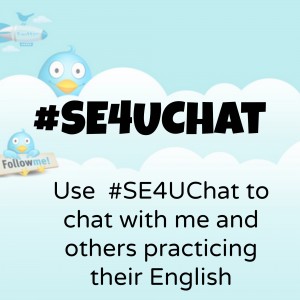Free Interactive English Practice on Twitter
Practice your English for free everyday by using #SE4UChat on Twitter
I’m going to start using a new hashtag on Twitter that encourages student participation. That means YOU! I will use the tag #SE4UChat for any interactive tweets. When you hit reply, make sure to use the same tag and I will always see it and respond. Hopefully others will as well!
Using Twitter to Improve English
Twitter is a great place to practice your English. In this article > English on Twitter, I list popular hashtags used by English teachers and students to communicate on Twitter. Hashtags are a great way to find exactly what you are looking for. If you are looking to chat, use #SE4UChat and I’ll get back to you as soon as possible.
Follow people and topics that interest you and read the links they share in English. This will help you to expand your vocabulary and improve your grammar structure.
Get Interactive
In order to truly improve your English skills (or any language) you have to USE the language. Produce it. Construct sentences using the vocabulary and grammar that you have previously learned. Only reading things isn’t going to get you to the next level, you must get involved with using the language.
Make Mistakes
Making mistakes is all part of the learning process. Nobody likes to make mistakes, but you just have to try! Reply to one of my tweets and if your sentence isn’t correct, I will correct it and then you will have learned from your mistake. If you don’t try, you’ll never know if you are ‘doing it right’. This is a very common mistake for language learners, they don’t try because they are embarrassed and therefore, never progress.
It’s FREE
There is no cost involved when you are practicing on Twitter or other social media platforms. Take advantage of the tweets I send out and use them to improve your English skills and accomplish your goals.
I hope to see you on Twitter soon! My user name is SkypEnglish4U and you can also find me by using #SE4UChat

